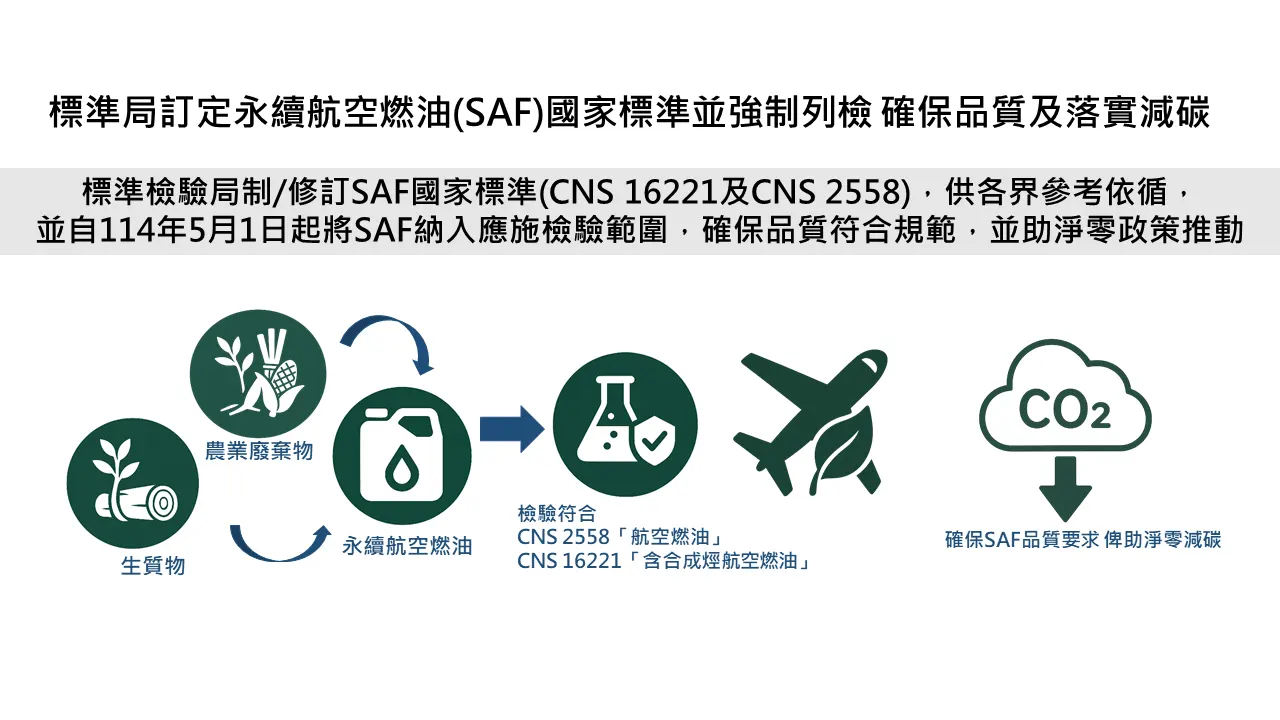BSMI Introduces National Standards and Mandatory Inspections for Sustainable Aviation Fuel to Ensure Quality and Advance Carbon Reduction Goals
BSMI Introduces National Standards and Mandatory Inspections for Sustainable Aviation Fuel to Ensure Quality and Advance Carbon Reduction Goals
 Starting May 1, 2025, the Bureau of Standards, Metrology and Inspection (BSMI) will include Sustainable Aviation Fuel (SAF) under its mandatory inspection regime to ensure compliance with quality standards and support the implementation of net-zero policies.
Starting May 1, 2025, the Bureau of Standards, Metrology and Inspection (BSMI) will include Sustainable Aviation Fuel (SAF) under its mandatory inspection regime to ensure compliance with quality standards and support the implementation of net-zero policies.
In response to global climate change and the push for carbon reduction policies, the use of sustainable aviation fuel (SAF) has become a major trend in low-carbon transportation development worldwide. To align with national aviation policy and industry demands, Bureau of Standards, Metrology and Inspection (BSMI) has established national standards for SAF and included it within the scope of mandatory inspection. This move ensures product quality compliance and supports the aviation industry in reaching net-zero carbon emission targets.
BSMI explained that SAF has been designated as a key action under Taiwan’s national carbon reduction plan by the Executive Yuan. In support of this initiative, BSMI has referred to international standards ASTM D7566 and ASTM D1655 in formulating and revising CNS 16221 "Aviation Turbine Fuel Containing Synthesized Hydrocarbons" and CNS 2558 "Aviation Turbine Fuels." These standards outline quality requirements, such as total sulfur content, distillation properties, copper strip corrosion, and thermal stability, for SAF produced through various processes, as well as the corresponding testing methods. These specifications provide a framework for domestic aviation fuel manufacturers to follow.
BSMI further stated that SAF is primarily derived from non-petroleum sources such as waste cooking oil. Compared to traditional petroleum-based aviation fuels, SAF offers significant carbon reduction benefits. The Ministry of Transportation and Communications (MOTC) has set a goal for SAF to account for 5% of total aviation fuel consumption by 2030. Ensuring quality is essential alongside carbon reduction. Thus, SAF is now subject to mandatory inspection requirements. All SAF products, whether imported or locally produced, must meet the specifications outlined in CNS 16221 or CNS 2558 before being imported or distributed, ensuring that SAF supplied throughout the chain complies with national standards.
